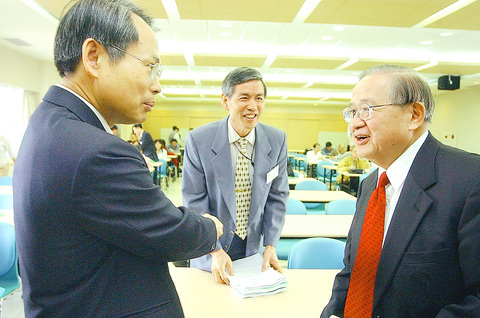Local pro-Taiwan independence activists yesterday said that China is the troublemaker in the Taiwan Strait and suggested a new Constitution as a response to China's drafting the "Anti-independence Law," a secession law that could provide the legal basis for using force against Taiwan.
"We actually do not have to worry about that too much because it is China's law, not ours. And their law enforcement offices do not have jurisdiction in Taiwan," said Chen Lung-chu (陳隆志), president and CEO of the Taiwan New Century Foundation (台灣新世紀文教基金會).

PHOTO: LIU HSING-TEH, TAIPEI TIMES
According to Chen, China's drafting of the "Anti-independence Law" is to legalize its potential military strikes against Taiwan in the future. However, he also said that China's new law is only effective within its own territory. Taiwan has never been a part of its territory, so no matter what law it uses, it is useless.
Chen made his remarks yesterday at the beginning of a seminar organized by the foundation. He said that the Taiwanese people should actually respect China's establishment of the new law.
"The real relationship between us [Beijing and Taipei] should be to respect each other and help each other. However, unfortunately they [China] never give up using force against Taiwan, although we have more than once tried to show our sincerity," Chen said.
"We are two different countries. Taiwan is an independent country. This is a fact and it is very clear," he continued. Former National Security Council senior advisor and former Taiwan Solidarity Union secretary-general Su Chin-chiang (蘇進強) also echoed Chen's remarks at the seminar.
"What we need is constructive and cooperative thoughts and attitudes, instead of challenging each other like this," Su said.
In the meantime, Su also endorsed the pan-green camp's idea to draft a new Constitution in 2006.
"A new Constitution will protect our country," Su said. "Our current Constitution was drafted in China for Chinese people. However, we do not own that soil any more and we need something for Taiwanese people, not the Chinese."

SHIPS, TRAINS AND AUTOMOBILES: The ministry has announced changes to varied transportation industries taking effect soon, with a number of effects for passengers Beginning next month, the post office is canceling signature upon delivery and written inquiry services for international registered small packets in accordance with the new policy of the Universal Postal Union, the Ministry of Transportation and Communications said yesterday. The new policy does not apply to packets that are to be delivered to China, the ministry said. Senders of international registered small packets would receive a NT$10 rebate on postage if the packets are sent from Jan. 1 to March 31, it added. The ministry said that three other policies are also scheduled to take effect next month. International cruise ship operators

NUMBERS IMBALANCE: More than 4 million Taiwanese have visited China this year, while only about half a million Chinese have visited here Beijing has yet to respond to Taiwan’s requests for negotiation over matters related to the recovery of cross-strait tourism, the Tourism Administration said yesterday. Taiwan’s tourism authority issued the statement after Chinese-language daily the China Times reported yesterday that the government’s policy of banning group tours to China does not stop Taiwanese from visiting the country. As of October, more than 4.2 million had traveled to China this year, exceeding last year. Beijing estimated the number of Taiwanese tourists in China could reach 4.5 million this year. By contrast, only 500,000 Chinese tourists are expected in Taiwan, the report said. The report

The Forestry and Nature Conservation Agency yesterday launched a gift box to market honey “certified by a Formosan black bear” in appreciation of a beekeeper’s amicable interaction with a honey-thieving bear. Beekeeper Chih Ming-chen (池明鎮) in January inspected his bee farm in Hualien County’s Jhuosi Township (卓溪) and found that more than 20 beehives had been destroyed and many hives were eaten, with bear droppings and paw prints near the destroyed hives, the agency said. Chih returned to the farm to move the remaining beehives away that evening when he encountered a Formosan black bear only 20m away, the agency said. The bear

Chinese embassy staffers attempted to interrupt an award ceremony of an international tea competition in France when the organizer introduced Taiwan and displayed the Republic of China flag, a Taiwanese tea farmer said in an interview published today. Hsieh Chung-lin (謝忠霖), chief executive of Juxin Tea Factory from Taichung's Lishan (梨山) area, on Dec. 2 attended the Teas of the World International Contest held at the Peruvian embassy in Paris. Hsieh was awarded a special prize for his Huagang Snow Source Tea by the nonprofit Agency for the Valorization of Agricultural Products (AVPA). During the ceremony, two Chinese embassy staffers in attendance